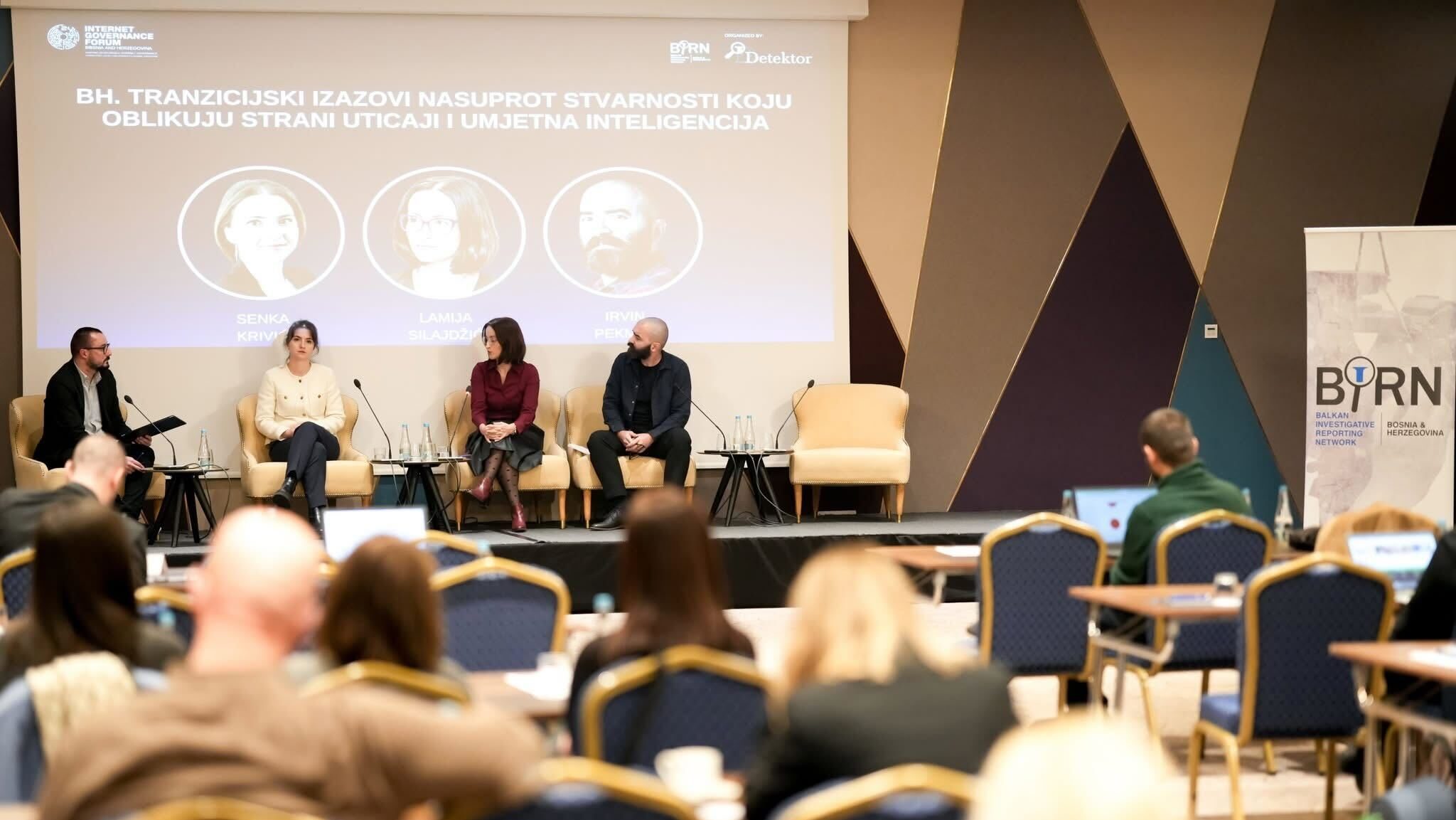This post is also available in: Bosnian
 Internet Governance Forum. Photo: Detektor
Internet Governance Forum. Photo: Detektor
Enes Hodzic, a journalist with the Balkan Investigative Reporting Network of Bosnia and Herzegovina (BIRN BiH), noted that numerous challenges, especially in the transitional period, have made BiH vulnerable to malign influences, particularly with the growing threat of artificial intelligence (AI), which enables faster and easier content generation.
“A recent survey conducted in BiH shows that 90 percent of journalists are actually aware of what comes from artificial intelligence, but only two percent of media outlets in BiH actually use artificial intelligence tools,” Hodzic said.
He pointed out that malign actors, such as Russia and China, exploit BiH’s weaknesses through disinformation campaigns, often using AI to blur the line between fact and fiction. This affects all sectors of society, especially when it comes to human rights.
Discussing how the traditional media responds to disinformation, Lamija Silajdzic, a professor at the Political Sciences Faculty of Sarajevo University, said that the impact of disinformation and malign content on the social and political landscape in BiH is very significant, with the potential to deepen existing societal divisions and further erode already weak trust in institutions.
“Trust in the media in BiH is definitely low because the media are very often perceived by the public as a tool of political structures. Some are under significant political pressure, some are under significant economic pressure, and this has weakened their position as independent and credible partners in public discourse,” Silajdzic explained.
She attributed the decline in public trust to poor financial conditions, workforce shrinkage, and difficulty adapting to the digital era and its associated challenges. She notes that media networks invest very little in training journalists to combat AI-generated content and recognize disinformation.
BIRN BiH journalist Irvin Pekmez discussed foreign disinformation in BiH, emphasizing the importance of understanding the objectives of foreign powers, such as destabilization from countries like the Russian Federation.
“We have shown on several occasions that aims to destabilize BiH and the region, and that spreading general disinformation is used as a tool in this context to create the destabilization,” Pekmez said. He pointed out that destabilizing forces have migrated from platforms such as Meta and X, which restricted their actives, to more permissive platforms such as Telegram.
Pekmez explained that Telegram has become a key platform for spreading disinformation, which then infiltrates major media outlets, many of which are state-controlled or were part of the public broadcasting services in BiH or Serbia. Notably, both of these countries allow the operation of this platform, which is under sanctions.
He explained that the interests of companies from the People’s Republic of China are different, as they aim not to destabilize BiH but to generate profit.
“This isn’t about disinformation, it’s about withholding information, such as details about project costs, how many people work on projects, where the workers come from, and what the price of the material is,” he said, adding that journalists typically have no access to such information.
He concluded that citizens, as end-users of information, can be victimized by these tactics and must be better informed about the dangers posed by countries such as China, Russia, Iran, and Turkey. For ordinary citizens, the threats posed by these countries may seem remote.
Senka Krivic, a professor at the Electrical Engineering Faculty of Sarajevo University, stated that artificial intelligence has penetrated all parts of social life. Its impact on the media includes the generation of fake images, videos, and texts to spread disinformation.
She explained that ChatGPT is used by many people to write various texts and assist with writing and content creation. However, even when the user is well-intentioned, the use of these technologies can result in half-information or misinformation, because the techniques do not guarantee the credibility of the information.
“There are already technologies that can detect AI content. I would say that it is important to restore public trust in the media and it is important that the public know what credible sources of information are. In my opinion, the media at large has turned away from journalism with educational purposes and, of course, the most important thing is to change the laws in BiH,” Krivic said.

